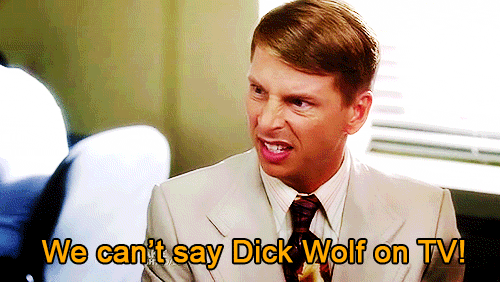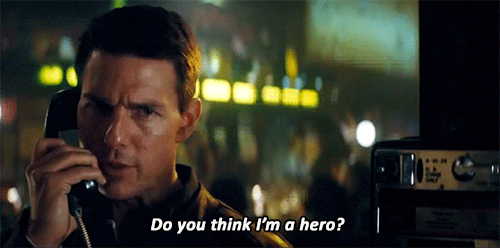- Cinematic Fanatic
- Posts
- Why We Love Crime Shows
Why We Love Crime Shows
Plus: Fincher's Mindhunter movies?, Mel Brooks returns, Bruce Springsteen movie, and Tom Cruise's first Oscar.
👋 Your watchlist just got better.
🎥 28 Years Later | 6.20
🎥 Pixar’s Elio | 6.20
🎥 Bride Hard* | 6.20
*We spoke with Anna Camp about Bride Hard and You right here.
TRENDING
🔍 Mindhunter could return as three 2-hour movies after Holt McCallany-David Fincher meeting, but "David has to be happy with scripts."
🏆 Tom Cruise receives honorary Oscar for "commitment to filmmaking community, theatrical experience, and stunts community" this year.
🚀 Rick Moranis returns as Dark Helmet in "Spaceballs 2" — his first live-action film role since 1996 (Mel Brooks shares on X).
🎭 Noah Baumbach's R-rated "Jay Kelly" stars George Clooney, Adam Sandler, Laura Dern in "funny, emotional coming-of-age film about adults."
🧠 Michel Gondry secretly told Kate Winslet "go as big as you want, this is comedy!" while telling Jim Carrey "this is drama" on Eternal Sunshine.
🦇 Robert Downey Jr. met with Christopher Nolan for Scarecrow role in Batman Begins before losing part to Cillian Murphy.
🎸 First trailer drops for "Deliver Me From Nowhere" starring Jeremy Allen White as Bruce Springsteen, theaters October 24.
TOGETHER WITH 1440
Looking for unbiased, fact-based news? Join 1440 today.
Join over 4 million Americans who start their day with 1440 – your daily digest for unbiased, fact-centric news. From politics to sports, we cover it all by analyzing over 100 sources. Our concise, 5-minute read lands in your inbox each morning at no cost. Experience news without the noise; let 1440 help you make up your own mind. Sign up now and invite your friends and family to be part of the informed.
FEATURE
🎭 Malcolm Gladwell: 4 Types of Crime Fiction
Malcolm Gladwell didn't just crack the code of crime fiction—he built a framework that explains why we're addicted to justice porn. Hidden in a Joe Rogan podcast from 2022, the bestselling author dropped a theory so elegant it should be taught in film schools worldwide.
"I have no idea why anyone would ever watch that show," Gladwell confessed about Law & Order, before revealing his secret obsession with subverting the franchise. His fantasy? Getting to minute 47 of an episode and unleashing "some savage U-turn that just appalls and outrages." But this wasn't just about trolling Dick Wolf—it was about exposing our desperate need for narrative comfort.

The Four Directions Theory: How Stories Navigate Justice
Gladwell's breakthrough came from recognizing that all crime stories exist on a moral compass. Not north, south, east, and west—but four distinct relationships between heroes and the systems they inhabit.

The Western: No System, Pure Vigilance. "A Western is a world in which there is no law and order. And a man shows up and imposes, personally, law and order on the territory." Think classic gunslinger stories, but Gladwell's genius insight? Modern Westerns are hiding in plain sight. Jack Reacher novels are "21st century Westerns"—a retired army investigator who "never calls the cops" and "just murders everyone on his own."

The Northern: System Perfection. "Law and order exists, and law and order is morally righteous. The system works." Law & Order itself exemplifies this—"a functioning apparatus of justice, which reliably and accurately produces the correct result in confronting criminality, every single day." Sherlock Holmes lives here too. "There's no corruption in the police department. They may be bumbling, and Charles got to help them out. But there's never a case where there's a rotten cop."

The Eastern: Corruption From Within. "There is law and order, so there are institutions of justice, but they've been subverted by people from within." Serpico defined this category—"It's a crooked cop, who is, it's the bad apple, who has screwed up. Tons and tons of Hollywood movies are Easterns."

The Southern: Total System Failure. "The entire apparatus is corrupt, and where the reformer is not an insider, but an outsider." Every John Grisham novel operates from the same premise: "the system is rotten to the core and only this white knight who comes in from the outside can save us."
The Psychology of Justice Comfort Food
Gladwell's most provocative observation? "I don't know any men who watch them and I'm coming to the belief that they're actually for women." Law & Order represents "a very comforting kind of reassuring fantasy about how the world works."
This isn't about gender—it's about emotional needs. We don't just consume crime stories for entertainment; we consume them for psychological regulation. Westerns appeal to those who've lost faith in institutions. Northerns comfort those who still believe systems can work. Easterns satisfy those who think reform is possible. Southerns speak to those convinced everything is broken.

The Cultural Geography of Justice
"The Brits love the Northern," Gladwell noted, and this reveals something profound about national psychology. British detective stories assume institutional competence—even when individual cops bumble, the system itself isn't corrupt. American crime fiction skews heavily Western and Southern, reflecting our deep skepticism of authority.
Gladwell's framework doesn't just categorize stories—it diagnoses our collective anxieties about power, justice, and social order. Every crime show we binge, every thriller we devour, every detective novel we consume is actually a political statement about how we believe the world works—or how we wish it worked.
The theory is so simple it's revolutionary: we're not just watching crimes get solved. We're watching our deepest beliefs about justice get validated, one episode at a time.
PUNCHLINES
I told you we’d be back
— Mel Brooks (@MelBrooks)
4:17 PM • Jun 12, 2025
George Clooney says his son has become a huge Batman fan
"I said to him, 'I was Batman' ... and he was like, 'not really' ... and I was like, 'you have no idea how right you are'" 😂
(via @etnow)
— Culture Crave 🍿 (@CultureCrave)
6:49 AM • Jun 17, 2025
Quentin Tarantino says True Detective is boring
"I tried to watch the first episode of 'True Detective' (2014) season one, and I didn’t get into it at all. I thought it was really boring. And season two looks awful."
— Emir Han (@RealEmirHan)
9:06 PM • Jun 18, 2025



